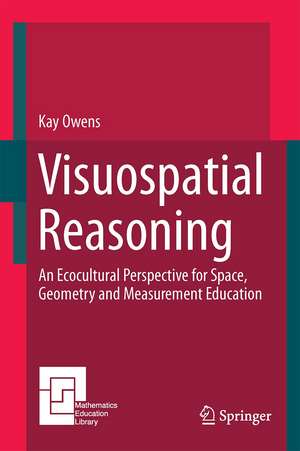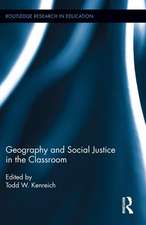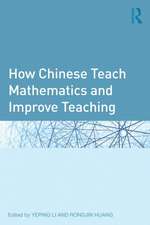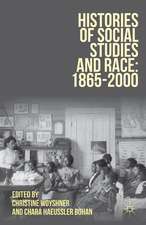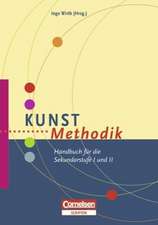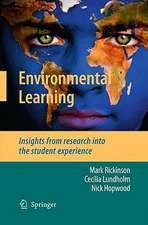Visuospatial Reasoning: An Ecocultural Perspective for Space, Geometry and Measurement Education: Mathematics Education Library, cartea 111
Autor Kay Owensen Limba Engleză Hardback – 21 noi 2014
For a number of years, two themes in the field of mathematics education have run parallel with each other with only a passing acquaintance. These two areas are the psychological perspective on visuospatial reasoning and ecocultural perspectives on mathematics education. This volume examines both areas of research and explores the intersection of these powerful ideas.
In addition, there has been a growing interest in sociocultural aspects of education and in particular that of Indigenous education in the field of mathematics education. There has not, however, been a sound analysis of how environmental and cultural contexts impact visuospatial reasoning, although it was noted as far back as the 1980s when Alan Bishop developed his duality of visual processing and interpreting visual information. This book provides this analysis and in so doing not only articulates new and worthwhile lines of research, but also uncovers and makes real a variety of useful professional approaches in teaching school mathematics. With a renewed interest in visuospatial reasoning in the mathematics education community, this volume is extremely timely and adds significantly to current literature on the topic.
| Toate formatele și edițiile | Preț | Express |
|---|---|---|
| Paperback (1) | 646.11 lei 6-8 săpt. | |
| Springer International Publishing – 22 sep 2016 | 646.11 lei 6-8 săpt. | |
| Hardback (1) | 652.49 lei 6-8 săpt. | |
| Springer International Publishing – 21 noi 2014 | 652.49 lei 6-8 săpt. |
Din seria Mathematics Education Library
-
 Preț: 389.70 lei
Preț: 389.70 lei - 15%
 Preț: 645.96 lei
Preț: 645.96 lei - 18%
 Preț: 742.97 lei
Preț: 742.97 lei - 18%
 Preț: 1394.84 lei
Preț: 1394.84 lei - 18%
 Preț: 942.10 lei
Preț: 942.10 lei - 18%
 Preț: 1544.80 lei
Preț: 1544.80 lei - 18%
 Preț: 1325.82 lei
Preț: 1325.82 lei - 18%
 Preț: 1225.48 lei
Preț: 1225.48 lei - 15%
 Preț: 643.34 lei
Preț: 643.34 lei - 18%
 Preț: 1221.07 lei
Preț: 1221.07 lei - 18%
 Preț: 952.89 lei
Preț: 952.89 lei - 18%
 Preț: 950.52 lei
Preț: 950.52 lei - 24%
 Preț: 1445.43 lei
Preț: 1445.43 lei - 18%
 Preț: 1224.54 lei
Preț: 1224.54 lei - 15%
 Preț: 651.19 lei
Preț: 651.19 lei -
 Preț: 391.61 lei
Preț: 391.61 lei - 18%
 Preț: 948.16 lei
Preț: 948.16 lei - 18%
 Preț: 944.19 lei
Preț: 944.19 lei - 18%
 Preț: 1380.95 lei
Preț: 1380.95 lei - 18%
 Preț: 947.85 lei
Preț: 947.85 lei - 18%
 Preț: 948.61 lei
Preț: 948.61 lei - 15%
 Preț: 635.31 lei
Preț: 635.31 lei - 15%
 Preț: 644.63 lei
Preț: 644.63 lei - 15%
 Preț: 646.43 lei
Preț: 646.43 lei - 15%
 Preț: 647.59 lei
Preț: 647.59 lei
Preț: 652.49 lei
Preț vechi: 767.63 lei
-15% Nou
Puncte Express: 979
Preț estimativ în valută:
124.87€ • 129.88$ • 103.09£
124.87€ • 129.88$ • 103.09£
Carte tipărită la comandă
Livrare economică 14-28 aprilie
Preluare comenzi: 021 569.72.76
Specificații
ISBN-13: 9783319024622
ISBN-10: 3319024620
Pagini: 200
Ilustrații: XXXI, 377 p. 114 illus., 29 illus. in color.
Dimensiuni: 155 x 235 x 22 mm
Greutate: 0.75 kg
Ediția:2015
Editura: Springer International Publishing
Colecția Springer
Seria Mathematics Education Library
Locul publicării:Cham, Switzerland
ISBN-10: 3319024620
Pagini: 200
Ilustrații: XXXI, 377 p. 114 illus., 29 illus. in color.
Dimensiuni: 155 x 235 x 22 mm
Greutate: 0.75 kg
Ediția:2015
Editura: Springer International Publishing
Colecția Springer
Seria Mathematics Education Library
Locul publicării:Cham, Switzerland
Public țintă
ResearchCuprins
Introduction: Visuospatial reasoning in context.- Visuospatial reasoning in 20th century psychology-based studies.- Changing Perspective: sociocultural elaboration.- Place, culture, language, and visuospatial reasoning.- Visuospatial reasoning in cultural activities in Papua New Guinea.- Visuospatial reasoning in other cultures.- The impact of an ecocultural perspective of visuospatial reasoning on mathematics education.- The importance of an ecocultural perspective for Indigenous and transcultural education.- Visuospatial reasoning in contexts with digital technology.- An ecocultural perspective on visuospatial reasoning in geometry and measurement education.- Appendices.- Index.- References.
Textul de pe ultima copertă
This book develops the theoretical perspective on visuospatial reasoning in ecocultural contexts, granting insights on how the language, gestures, and representations of different cultures reflect visuospatial reasoning in context.
For a number of years, two themes in the field of mathematics education have run parallel with each other with only a passing acquaintance. These two areas are the psychological perspective on visuospatial reasoning and ecocultural perspectives on mathematics education. This volume examines both areas of research and explores the intersection of these powerful ideas.
In addition, there has been a growing interest in sociocultural aspects of education and in particular that of Indigenous education in the field of mathematics education. There has not, however, been a sound analysis of how environmental and cultural contexts impact visuospatial reasoning, although it was noted as far back as the 1980s when Alan Bishop developed his duality of visual processing and interpreting visual information. This book provides this analysis and in so doing not only articulates new and worthwhile lines of research, but also uncovers and makes real a variety of useful professional approaches in teaching school mathematics. With a renewed interest in visuospatial reasoning in the mathematics education community, this volume is extremely timely and adds significantly to current literature on the topic.
For a number of years, two themes in the field of mathematics education have run parallel with each other with only a passing acquaintance. These two areas are the psychological perspective on visuospatial reasoning and ecocultural perspectives on mathematics education. This volume examines both areas of research and explores the intersection of these powerful ideas.
In addition, there has been a growing interest in sociocultural aspects of education and in particular that of Indigenous education in the field of mathematics education. There has not, however, been a sound analysis of how environmental and cultural contexts impact visuospatial reasoning, although it was noted as far back as the 1980s when Alan Bishop developed his duality of visual processing and interpreting visual information. This book provides this analysis and in so doing not only articulates new and worthwhile lines of research, but also uncovers and makes real a variety of useful professional approaches in teaching school mathematics. With a renewed interest in visuospatial reasoning in the mathematics education community, this volume is extremely timely and adds significantly to current literature on the topic.
Caracteristici
The first comprehensive book on mathematical reasoning in Papua New Guinea Utilizes an ecocultural perspective while focusing on current research Provides a strong focus on space, geometry and measurement
